Hyundai Kappa best performance parts.
"All you need to know about tuning the Hyundai Kappa engine!"
We outline options for your Kappa tuning and point out the premier mods that work.
Hyundai Kappa are popular engines and with carefully chosen uprated upgrades like a remap, turbo upgrades and camshafts you will noticeably improve your driving experience.
History, Power & Specs of the Engine
A straight 3 and 4 engine from Hyundai, DOHC 16-valve
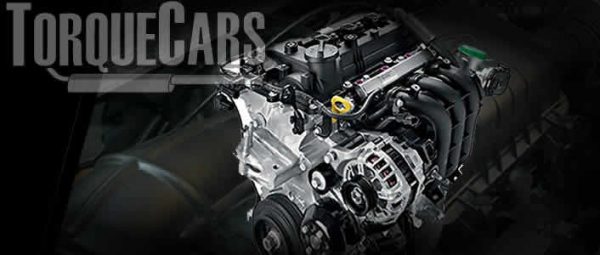
- 1.0 L (998 cc)
- 1.2 L (1,197 cc)
- 1.2 L (1,248 cc)
- 1.4 L (1,353 cc)
- 1.4 L (1,397 cc)
- 1.6 L (1,579 cc)
Kappa
- 1.2 L 76hp at 5,200 rpm and 82 lbft of torque at 4,000 rpm.
- 1.25 78hp at 6,000 rpm and 87 lbft of torque at 4,000 rpm
- 1.4 L 94hp at 6,000 rpm and 95 lbft of torque at 4,000 rpm
- 1.4 L turbo 128hp at 5,500 rpm and 156 lbft of torque at 1,400 rpm
Kappa II ( VVT was added)
- 1.0 L 68hp at 6,200 rpm and 70 lbft of torque at 3,500 rpm.
- 1.25 L 86hp at 6,000 rpm and 90 lbft of torque at 4,000 rpm
Kappa III
- 1.0 T-GDi 118 hp; at 6,000 rpm and 127lbft of torque between 1,500 and 4,000 rpm.
- 1.4 T-GDi 138 hp at 6,000 rpm and 178 lbft of torque between 1,500 and 3,200 rpm.
- 1.6 L 103 hpat 5,700 rpm and 108 lbft of torque at 4,000 rpm
Best Kappa tuning parts
Just because a parts is popular with Kappa owners it doesn't mean its worth having, instead we'll ultimate parts that will give your Kappa the biggest power gain return for your cash.
Altering your Kappa camshaft will make a dramatic difference to the engine power band. Choosing a higher performance camshaft profile raises the power band accordingly.
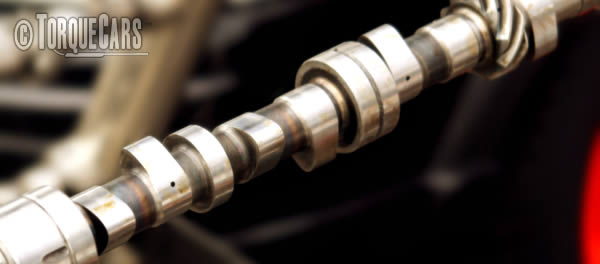
Fast road camshafts usually raise the torque throughout the rev band, you may sacrifice a little low end bhp but high end rpm power will be lifted.
Motorsport and race camshafts, raise the high end rpm power band but as a result the car will not idle smoothly and low end power nearly always suffers.
On a road car must carefully try to match your power band to your cars usage.
I'd never find a Motorsport and race camshaft is a pleasure to live with when driving in heavy traffic. The low end idle will be very lumpy and irregular, so something you would notice on a track when you drive in the upper third of the rpm band, but on roads this is a serious issue and we've heard from lots of drivers lamenting their decision to add an extreme competition cam profile to their engine.
Each engine responds better to more aggressive camshaft durations than others.
The engine timing and fuel pump and injectors also will make differences on the power gains you'll make.
Altering valve durations can alter the power band and on most engines the exhaust and intake durations do not need to match, although most cams and tuners use matched pairs there are some advantages to extending the intake or exhaust durations.
Please watch our video which covers the 5 principles of tuning your car. Be sure to keep up with our latest YouTube content and subscribe.
Best Engine Mods for your Car
- Engine Tunes - engine tuning/remapping provides the most advantage in terms of cost savings, aftermarket ECUs, and piggyback ECUs are all alternatives.
- Intake and Exhaust - Note that on their own these mods will NOT ADD POWER in most cases, but they can help enhance power after other mods by removing the restriction.
- Head work - The goals of porting and flowing the head are to get air flowing into the engine while removing flow restrictions and turbulence.
- Turbo upgrades - on the turbo engine it makes sense to swap the turbo and injectors so you can run higher power figures, converting a NASP to turbo while possible is not recommended.
So we will break these usual recommendations down and see if these 'best mods' are appropriate for your car and we shall look in detail at the mods that will work for you and your needs.
Typical stage 1 mods often include: drilled & smoothed airbox, Intake manifolds, Remaps/piggy back ECU, Panel air filters, Fast road camshaft, Sports exhaust header/manifold.
Typical stage 2 mods often include: high flow fuel injectors, fuel pump upgrades, induction kit, Sports catalyst & performance exhaust, Ported and polished head, Fast road cam.
Typical stage 3 mods often include: Twin charging conversions, Internal engine upgrades (head flowing porting/bigger valves), Competition cam, Engine balancing & blueprinting, Adding or Upgrading forced induction (turbo/supercharger), Crank and Piston upgrades to alter compression.
ECU Remaps on the Kappa
ECU mapping will help release the full potential of all the modifications you've fitted to your Kappa.
(In some cases, as the factory ECU is locked flashing is not an option, so an aftermarket ECU is the route to take, and many of these will outperform factory ECU's but make sure it has knock protection and that you get it setup properly.)
It will usually give you around 30% more power on turbocharged vehicles and 15% on NA (naturally aspirated) engines, but you mileage will vary depending on the modifications you've done and the condition of your engine.
Kappa intake & exhaust mods
It is the main goal of any engine modification task to pull air into the Kappa engine and removing the restriction in the intake is important.
Intake carry the air from the intake filter and allow it to be pulled into the engine and mixed with fuel.
The shape and flow characteristics of the Intake can make a large improvement to fuel atomisation on the Kappa.
I usually find the intake chambers are in dire need of aftermarket parts, although a few manufacturers provide decently flowing plenum chambers and the Kappa is quite well designed so there are little in the way of gains to be had by replacing this unless you've added a lot more power to it.
Adding a Kappa larger valve kit, carrying out port work and head flowing will also increase bhp, and as an added benefit will make space for a better bhp increase on other parts.
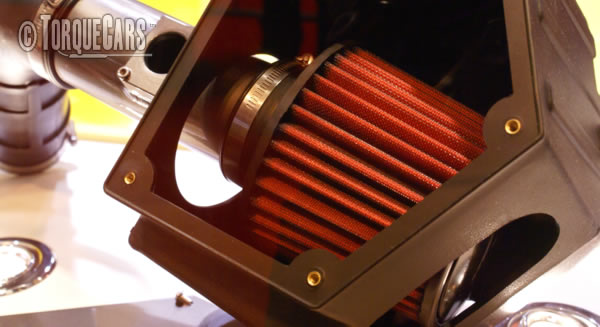
Turbo upgrades
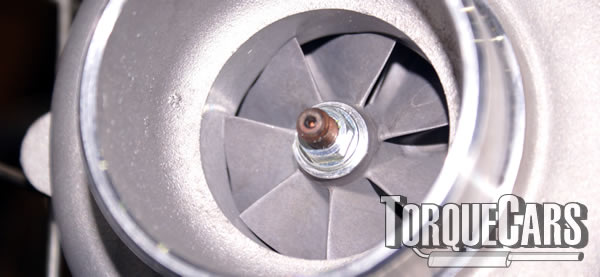
NA (naturally aspirated) engines need quite a lot of work when you add a turbo, so we have a separate guide to help you take into account the pros and cons of going this route on your Kappa
The more air to get into an engine, the more fuel it can burn and uprating the induction with a turbocharger upgrade makes massive power gains.
If your car has a turbocharger tuning parts are more reliable and most turbocharged engines are made using uprated components.
There are weak spots for every engine, with some being over specified and some only just able to handle stock power
It is important to find these restrictions and upgrade to higher quality components to handle the power.
We've seen people spending a a stack of money on turbo charger upgrades on the Kappa only to watch the car catastrophically fail just after it's first rolling road session.
Bigger turbo units will usually experience low end lag, and smaller turbo units spool up really quickly but do not have the top end power band gains.
Thankfully the market of turbo units is always improving and we now see variable vane turbo units, where the vane profile is altered according to speed to lower lag and increase top end bhp and torque.
Twin scroll turbo units divert the exhaust flow into 2 channels and feed these at differently angled vanes in the turbocharger. They also improve the scavenging effect of the engine.
It is common that there's a limit in the air flow sensor MAF/MAP on these engines when loads more air is being sucked into the engine.
You'll see that 4 bar air sensors coping with quite large power gains, whereas the OEM air sensor sapped power at a much lower level.
Adding a supercharger or additional turbo will make large bhp gains, although more difficult to get working. We have a twincharger bhp adding guide if you want to read more.
Kappa Fuelling mods
You will need to ensure that the engine is not starved of fuel so should increase the fuelling when you start extending past 20% of a bhp increase.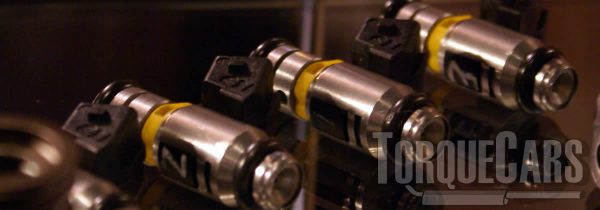 We would recommend you to over specify your injectors flow rate.
We would recommend you to over specify your injectors flow rate.
The rule of thumb is to add 20% when specifying an injector, this takes into account injector deterioration and gives some spare capacity should the engine require more fuel.
We think this one is common sense, but you'll need to match your fuel injector to the type of fuel your car uses as well.
All the following flywheel power targets will assume an injector duty cycle of 80% and a base of 58 psi of fuel pressure at idle.
4 Cylinder turbocharged engines
- 58 PSI 340cc/min 200hp
- 58 PSI 511cc/min 300hp
- 58 PSI 682cc/min 400hp
- 58 PSI 1022cc/min 600hp
4 Cylinder NA (naturally aspirated) engines
- 58 PSI 285cc/min 200hp
- 58 PSI 426cc/min 300hp
- 58 PSI 568cc/min 400hp
- 58 PSI 853cc/min 600hp
Kappa Exhaust Upgrades
You may need to upgrade your exhaust if your current exhaust is actually causing a restriction in flow.
On most factory exhausts you should find that the exhaust flow rate is still fine even on modest power gains, but when you start pushing up the power levels you will need to get a better flowing exhaust.
Don't go with the largest exhaust you can buy you'll slow up the exhaust flow rate - the best exhausts for power gains are usually between 1.5 to 2.5 inches. It is the shape and material more than the bore size.
Typically exhaust restrictions can be located the catalyst and filters installed, so adding a higher flowing sports alternative is the answer.
This keeps the car road legal and will flow much better due to its higher internal surface area and design, so has the added benefit of keeping your car road legal.
The alternative decat should be considered an off road only mod, as removing a catalyst is illegal in most territories and regions for road registered cars..
Weak spots Issues & problem areas on the Kappa
The Kappa engines are generally reliable and solid units, as long as you follow the manufacturers service schedules, and use a good quality oil to ensure longevity. Few problems should happen as long as they are regularly serviced and maintained.
Carbon build up in the head, particularly around the valves which will sap power or create flat spots, this is a larger issue on direct injection engines but should be looked out for on all engines. We have tips on removing carbon build up.
Some of our members have had issues with flat spots or glitches after applying mods and upgrades or tuning, this is not usually related to this engines design, so instead see our article on diagnosing flat spots and problems after tuning which should help you get the bottom of this issue.
Regular oil changes are vital on the Kappa, especially when tuned and will help extend the life and reliability of the engine.
If you would like to know more, or just get some friendly advice on Tuning your engine please join us in our friendly forum where you can discuss tuning options in more detail with our owners. It would also be worth reading our unbiased tuning articles to get a full grasp of the benefits and drawbacks of each modification.
Please help us improve these tips by sending us your feedback in the comments box below.
We love to hear what our visitors have got up to and which upgrades work best for you on your car. Which helps us keep our guides and tips up to date helping others with their modified car projects. Your feedback and comments are used to keep this page up to date, and help improve the accuracy of these articles which are kept updated and constantly revised.
If you've enjoyed this page we would be very grateful if you could share a link to it on your favourite forums or on your social media profiles, it helps us keep going.
Please Check out my YouTube channel, we're regularly adding new content...
PLEASE HELP: I NEED YOUR DONATIONS TO COVER THE COSTS OF RUNNING THIS SITE AND KEEP IT RUNNING. I do not charge you to access this website and it saves most TorqueCars readers $100's each year - but we are NON PROFIT and not even covering our costs. To keep us running PLEASE Donate here
If you liked this page please share it with your friends, drop a link to it in your favourite forum or use the bookmarking options to save it to your social media profile.
Feedback - What do You Think?
Please use our forums if you wish to ask a tuning question, and please note we do not sell parts or services, we are just an online magazine.
Help us improve, leave a suggestion or tip
Please watch this video and subscribe to my YouTube channel.

 Click to accept YouTube Cookies & Play.
Click to accept YouTube Cookies & Play.